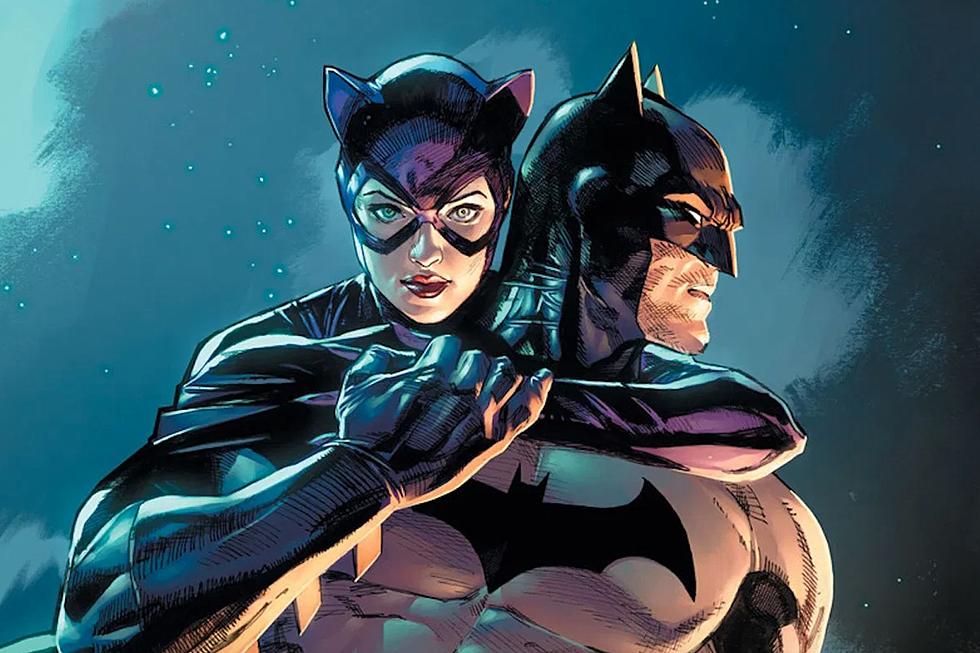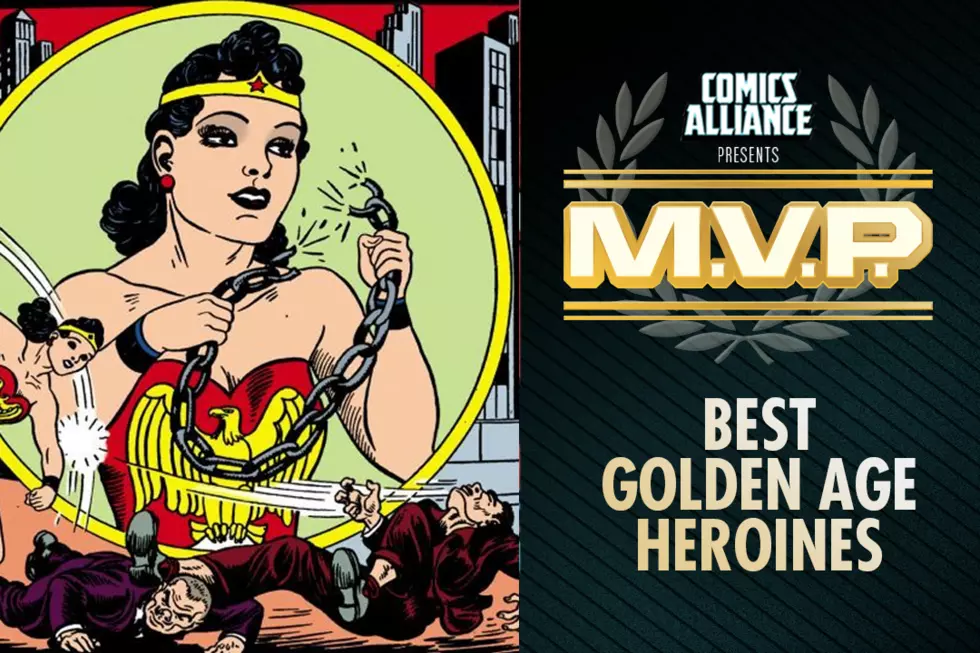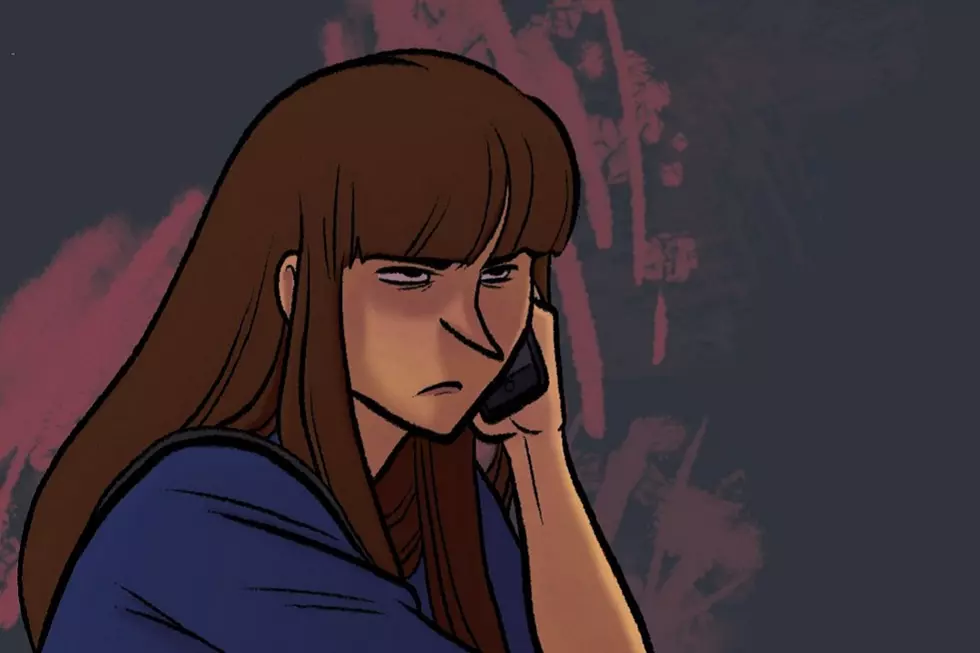
Outrage and Complacency: Responses to Frank Cho’s Spider-Gwen Cover
You may have missed it, but last week Frank Cho posted an image he'd drawn on a sketch cover of Spider-Gwen in a pose reminiscent of the Milo Manara Spider-Woman cover that drew a lot of negative attention. Many people were grossed out by Cho's drawing, including Spider-Gwen artist Robbi Rodriguez, while others jumped to Cho's defense, like J. Scott Campbell and Rob Liefeld. What began as not that big of a deal turned into the latest hot mess to preoccupy the industry, so let's talk about outrage and complacency in comics.
I didn't comment on the Frank Cho art, primarily because I really didn't care. It was not at all my sort of art, and it was pretty gross, but it was a sketch cover done for Cho's own benefit. The problem I had with the Manara cover, as well as the Rafael Albuquerque Batgirl cover was entirely in the commissioning of it, not anything against the artists. A publisher choosing to publish an objectifying image on the cover of a book meant to appeal to a new and/or diverse audience is a mistake.
But every artist has their own style, and art is subjective, so some styles will appeal to some people but not others. That's a fact of life. There's no such thing as an artist that appeals to everyone. So Cho drawing a teen girl in a creepy pose --- while distasteful and nothing I would ever buy --- didn't strike me as the sort of thing to get really angry about. Others felt differently. Again, art is subjective and people react differently to it, and that includes negative reactions.
Then Spider-Gwen artist Rodriguez commented on the cover, tweeting:
Many took this as a physical threat, although Rodriguez later clarified that it was not, adding:
That tone has its place and its audience, and it doesn't make you wrong for liking it. Shit, I like most of Milo Manara's main work. I think they're fantastic works within their subject and context. But out of context it can come off as tasteless since this country is still not mature about sexuality and sexual expression. More importantly, it becomes trashy when we are in the midst of the biggest new reader boom in years. At ECCC I never heard so many "this is my daughter/son's first comic" or "my wife has never picked up a comic till this book" or sister/brother, or other non-reader. It's fucking fantastic that the industry broke that wall. But every time I see those 10 gratuitous variant covers I cringe as I sign while said new readers watches.
Rodriguez makes the important and super-relevant point here that art like this can drive off a lot of the new readers that books like Spider-Gwen appeal to.
Still, this wasn't a variant cover, it was just a sketch Cho did for himself, in his own style, which happens to involve sexualizing and objectifying women. With an added dash of a "joke" about the Manara cover. Here's where things get really messy, though.
Cho drew another image, this time with Harley Quinn in the Manara Spider-Woman pose, and wrote this on his blog:
Wow. What a crazy couple of days it has been. My parody cover sketch of Spider-Gwen aping the infamous Manara Spider-Woman pose sent some of the hypersensitive people in a tizzy.
To be honest, I was amused and surprised by the uproar since it was, in my opinion, over nothing. It’s essentially a small group of angry and humorless people ranting against my DRAWING of a pretty woman. It’s utter nonsense. This world would be a better and a happier place if some people just grow a sense of humor and relax.
Now, I’m getting bombarded by various bloggers asking for an interview addressing this “scandal”. Instead of me wasting my breath and precious time over this non-issue replying to all the interviewers, I’ve drawn another cover sketch in response which will, hopefully, answer all the questions.
You'll notice that a lot of people who are criticized online for things like this use words like "hypersensitive" and "humorless." It's the same language people always use to defend jokes that dehumanize women. There's the automatic assumption that the people leveling the criticisms are a minority who just aren't "in" on the fun.
That assumption comes with a lot of baggage, not the least of which is that the majority of people agree with them, whether they say it or not. Everyone wants to think that they have the support of more people than their critics. But is that a safe assumption for anyone? In this era where the comics industry is faced with a great deal of change, the people who make up the majority are probably quite different than they were 10 years ago.
Anyway, then Liefeld jumped in to defend Cho and Campbell, an artist with a similar cheesecake style, saying on Facebook:
I just finished reading a disturbing rant by a fellow who took, in my humble opinion, uncalled for shots at two stellar talents in my industry, in our industry, Frank Cho and J J Scott Campbell. Let's establish here at the outset that these two are a pair of comic book wizards, visual stylists that have been at the top of the comic book mountain top, and have entertained the masses for nearly two decades. Both men are famous for their renderings of the female physique, an art form once referred to as "cheesecake" by possibly the best illustrator comic books ever saw, Dave Stevens.
Of particular interest here is Liefeld's comment about how these artists have been entertaining comics readers for nearly two decades. I wonder, perhaps, if the old guard of comics that came to success in the 90s resents the new comics readers that have no interest in their work? Regardless, it's not as if cheesecake hasn't had many, many decades to reign in comics.
Campbell responded to Liefeld, saying:
I do think it's perfectly fine to draw and depict, healthy, strong, beautiful, pretty, yes... dare I say occasionally "sexy" and alluring women in our industry. Can it go too far..? sure, as can anything that's considered art. But I think we self regulate just fine, we have for decades. But this groundswell that's going on with these blogs with an agenda and this faux outrage, suggesting that us artists who are predominately known for drawing attractive and pretty women need to "grow up" and suddenly leave the industry that we love and that loves us because of a noisy few... despite the evidence that the books we work on are selling in the high stratosphere is preposterous! Thank you for standing up for us Rob! I sincerely hope more start joining us! If you love what we do, stand the hell up for us and don't let these message boards and rogue artists dictate the narrative any longer!
And here's where I get angry. You see, no one ever said Cho couldn't draw in this way. Even the Mary Sue, who wrote about the Cho cover last week, said they didn't see him as a bad guy, but that it was uncool to draw a cover like this of Spider-Gwen given her role as an entry point into comics for many new readers.
This isn't about freedom of expression. I saw no calls for censoring Cho, just criticism of his choice to draw this particular character in this particular pose. After all, how does one censor a cover that a creator has drawn only for fun? Especially if you're not speaking for the government, which is the only entity with the power to censor anything?
Saying a cover is not in good taste is not the same as saying "get out of our industry!" Also, the idea that "we" (whatever "we" that is) self-regulate is an interesting one. Does that mean the "we" of comics artists, or the "we" of the comics industry? If the former, I'd love to see how J. Scott Campbell thinks he's self-regulated over the years, and if the latter, that implies that the current readers who do not care for Cho's drawing or Campbell's style are not part of the comics industry.
Campbell's assertion is full of false allegations, including this gem: "But this groundswell that's going on with these blogs with an agenda and this faux outrage, suggesting that us artists who are predominately known for drawing attractive and pretty women need to 'grow up' and suddenly leave the industry that we love and that loves us because of a noisy few... despite the evidence that the books we work on are selling in the high stratosphere is preposterous!"
Uh, what book is Campbell doing that is selling "in the high stratosphere"? I'm legitimately curious. If he's talking about books that he does covers for, is that something he can claim responsibility for? And again, no one that I have ever seen online has told any of these artists to leave comics. This is criticism, not a call for anyone's removal from the industry.
Here we see Liefeld and Campbell moving the goalposts. Now, instead of a simple critique of a sketch that some folks didn't like, these "faux outrage" people want all these "comic book wizards" out of the industry.
Art in the style of Campbell and Cho has its place. They can certainly do whatever comics they want. Same with Liefeld, for that matter, for all that he's one of the most criticized artists in comics.
Claiming "faux outrage" whenever you disagree with people who are upset on the internet is apparently the new hotness, but it doesn't make any sense. If people are outraged, they're outraged. "Faux outrage" suggests they're pretending to be outraged for some reason, but who the hell does that? Just because you don't agree with the outrage, doesn't mean it's fake. Sure, the internet is prone to waves of outrage that build and build --- and it's not the most healthy form for discourse. Twitter in particular can be dangerous at hyping people up over any issue. It's worth being wary of that. But people genuinely find this Cho drawing distasteful, and having a conversation about that is not a bad thing.
The implication, though, that because people have drawn comics for 20 years and supposedly "self-regulated" themselves from going too far means that they should continue to be high-profile is utterly ridiculous. Did these artists who came up in the 90s patiently wait for the artists of the 70s to be done drawing comics before they became big names? Or did the changing styles get them more work until they gradually replaced those who had come before?
Readerships change. Creators who want to draw pin-up books clearly have an audience that they talk to, so why wouldn't they want to do their own cheesecake work? That's their choice to make.
But publishers like Marvel and DC are the broad face of the comics industry. They can't afford to alienate new readers at a time when, yes, the industry is booming, but not entirely thanks to Marvel and DC. They need to welcome the new waves of readers in, and that probably means hiring fewer cheesecake artists.
It's not censorship if these new readers don't care for the exploitative ways women are sometimes drawn. This is how trends work. Styles change. Complacency means death for our industry.
There are artists who can evolve with the times and be successful for more than a couple of decades, and there are artists who can't evolve, but who carve out a niche after the height of their success and continue on gracefully. Since no one is actually asking Campbell or Cho to leave comics, it'll be interesting to see what direction they choose to go in.
More From ComicsAlliance


![When Everything Is Pink, Nothing Is Pink: Sarah Stern On Color And Creativity [Interview]](http://townsquare.media/site/622/files/2017/03/Cindersong-feat.jpg?w=980&q=75)

![How Conner And Palmiotti Reinvigorated Harley And Reimagined ‘The Jetsons’ [Interview]](http://townsquare.media/site/622/files/2017/03/Harley-Featured.png?w=980&q=75)




